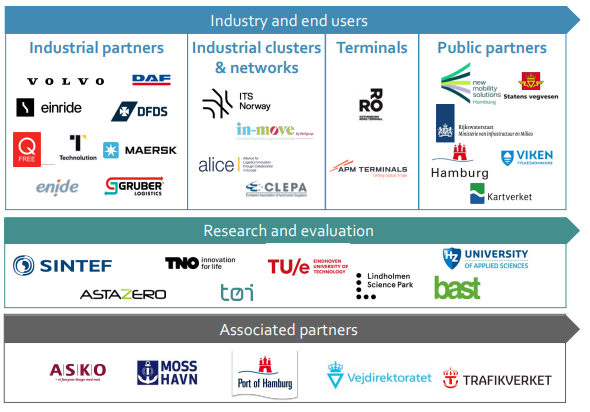CLEPA to be part of MODI project on Connected, Cooperative and Automated Mobility solutions for real-logistics operations
The European Commission, through the Horizon Europe framework program, has awarded a funding grant of € 23 Million for a total budget of approximately € 28 Million, and a 29-partner strong consortium to test and validate the implementation of CCAM solutions for real-logistics operations.
The MODI project will demonstrate automated heavy-haul vehicles without safety drivers use cases on the motorway corridor from Rotterdam in the Netherlands to Moss in Norway, crossing four national borders and demonstrating terminal operations at four different harbours and terminals en route. Automated transport will significantly contribute to improving European transport and logistic chains. The MODI research project will make substantial steps toward identifying and resolving barriers preventing this from coming true.
“As CLEPA we are glad to be part of this new Horizon Europe Project. We are eager to give our contribution to the communication and dissemination activities across the automotive industry, focusing primarily on the supply chain, exchanging information on developments and key results with our members whenever possible, while also strengthening the interactions with the CCAM Partnership in our role as Vehicles Technologies cluster leader”, says CLEPA’s Director Research, Innovation, New Mobility, David Storer.
Automated transport – the future of logistics
Introducing innovative, connected, cooperative and automated mobility (CCAM) can lead to many positive societal effects, such as safer and more efficient transport everywhere and for everyone. In mobility, the logistics sector is special because of the scarcity of heavy truck drivers, the pressure to reduce costs and the high utilisation of vehicles compared to private passenger transport. Therefore, profitable business cases as a consequence of the automated vehicles for the logistics sector are already very likely.
Even though the development of automated transport is accelerating, there are still many hindrances to overcome before we see a full-scale introduction of such transportation. These are related to the maturity of the technology itself but also to regulations, harmonisations, and social acceptance. The hindrances escalate when considering border-crossing transport.
With ITS Norway as project coordinator the ground-breaking MODI project aims to speed up the introduction of highly automated freight vehicles through demonstrations and to overcome barriers for the roll-out of automated transport systems and solutions in logistics. The transport corridor from the Netherlands to Norway has been chosen for demonstration activities. Netherlands, Germany, Denmark, Sweden, and Norway are among the European countries expected to be the first movers to implement fully automated vehicles.
The project comprises five use cases, each describing a part of the logistics chain. It identifies what is required for automated driving level without human interaction (known as SAE level 4), and what is not possible yet. The project will focus on understanding and overcoming the regulatory barriers and infrastructure shortcomings on the motorway corridor for public roads. The confined areas are terminals located by Rotterdam, Hamburg, Gothenburg, and Moss ports. Each terminal focuses on challenges like access control, charging, coordination with automated guided vehicles, loading/unloading and handover from public to confined areas.
In addition to the demonstrations, MODI provides detailed business models for the logistics sector, demonstrating that CCAM vehicles can lead to greater profits, especially when driving in a coordinated way. The project will be rolled out from October 2022 for 3.5 years.
Maturity and mix of partners representing the logistics value chain
The maturity and mix in the cooperation between leading companies and innovative, growing ones recognized for their real-world applications and expertise, as well as research organisations, paves the way for the replicability and sustainability of MODI outcomes.
The consortium comprises 29 partners, of whom 16 are representing industrial organisations, vehicle providers, logistics, and associations, 8 research organisations and universities, and 5 road authorities, public bodies, and cities/regions along the corridor, representing the complete value chain.

Industrial partners
• VOLVO TECHNOLOGY AB, SE
• EINRIDE AB, SE
• DAF TRUCKS NV (DAF), NL
• ENIDE, delivering digital solutions for sustainable mobility and logistics
• Q-FREE NORWAY (QFREE), NO
• TECHNOLUTION BV (TEC), NL
• DFDS AS (DFDS), DK
• A.P. MOLLER – MAERSK A/S (MAE), DK
• GRUBER LOGISTICS S.p.A., IT
• GOTHENBURG RORO TERMINAL AB, SE
• APM TERMINALS MAASVLAKTE II BV, NL
Clusters & Industrial networks
• ITS NORWAY, NO
• IN-MOVE, cluster in Mobility and Multi-Modal Logistics, ES
• ALICE, BE
• CLEPA, BE
Research organizations
• ASTAZERO AB, SE
• SINTEF AS, NO
• NEDERLANDSE ORGANISATIE VOOR TOEGEPAST NATUURWETENSCHAPPELIJK ONDERZOEK (TNO), NL
• TRANSPORTØKONOMISK INSTITUTT (TØI), NO
• BUNDESANSTALT FUER STRASSENWESEN (BasT), GE
• LINDHOLMEN SCIENCE PARK AKTIEBOLAG, SE
• TECHNISCHE UNIVERSITEIT EINDHOVEN, NL
• STICHTING HZ UNIVERSITY OF APPLIED SCIENCES, NL
Public authorities
• NMS NEW MOBILITY SOLUTIONS HAMBURG GMBH, DE
• STATENS VEGVESEN, NO
• MINISTERIE VAN INFRASTRUCTUUR EN WATERSTAAT, NL
• STATENS KARTVERK, NO
• FREIE UND HANSESTADT HAMBURG, DE
• VIKEN FYLKESKOMMUNE, NO
Associated partners
• TRAFIKVERKET, SE
• VEJDIREKTORATET, DK
• PORT OF HAMBURG, GE
• MOSS HAVN, NO
• ASKO, NO
Attachments
In: CLEPA News, Research & Innovation



